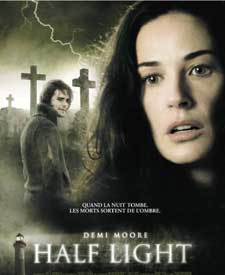 Half Light is in the main a gothic romance. It's so surface-slick & well acted that it seems odd that it's at the same time hokily written & with very poor visual continuity.
Half Light is in the main a gothic romance. It's so surface-slick & well acted that it seems odd that it's at the same time hokily written & with very poor visual continuity.
Set near & in a lighthouse, the lighthouse is sometimes shown sitting on a very tiny island, sometimes on a large island, sometimes with vegetation & ruins, sometimes a veritable desert island of empty rolling dunes.
It seems that the locations in Wales which doubled for Scotland were filmed without reference to the fake vistas generated by computer.
Our pretty heroine Rachel Carlson (Demi Moore) is renting the cabin on the main island in sight of the lighthouse rock. She is shown taking a walk through the woods to a tiny nearby village the day she arrives, but then for the rest of the film she's shown to be staying in a fairly stark unwooded area quite isolated.
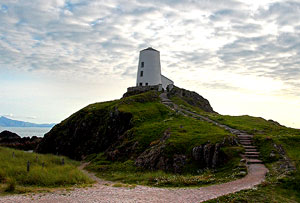 The film also assumes that it's safe to take a tiny boat across a rough bay even in a storm, & that no knowledge of tides is required to hop back & forth from the main island to the lighthouse island. The film also assumes that it's safe to take a tiny boat across a rough bay even in a storm, & that no knowledge of tides is required to hop back & forth from the main island to the lighthouse island.
There are many other problems of logic & visual continuity & just of common sense. Some plot glitches are so enormous that the whole story essentially falls to pieces if a viewer is so bold as to pay attention.
We're asked to believe a small village wouldn't notice the comings & goings of three strangers who don't wish to be seen, & whatever hired help & big boat the villains needed in order to pull such stunts as quickly emptying out a lighthouse full of possessions & make it look long unlived in.
When Rachel's duplicitous girlfriend Sharon (Kate Isitt) comes to visit her on the lighthouse island, that was not where Rachel was staying, so there was no reason for Sharon to arrive there instead of on the main island with the cabin, unless she was part of some evil plot to fool Rachel, which she was, which Rachel should have realized then & there, except the film would've been a half hour shorter if Rachel had half the intelligence the script alleges she possesses.
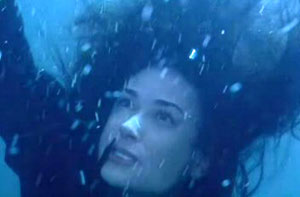 Scenes of Rachel horseback riding with her lover, bedroom scenes, romantic conversations, to a soundtrack suited for shopping at Victoria's Secret, renders much of the film a cloying Harlequin Romance, totally boring. Only the promise of eventual peril makes it bearable, & then only just. Scenes of Rachel horseback riding with her lover, bedroom scenes, romantic conversations, to a soundtrack suited for shopping at Victoria's Secret, renders much of the film a cloying Harlequin Romance, totally boring. Only the promise of eventual peril makes it bearable, & then only just.
It's a triple-whammy of a ridiculously shifting plot. Rachel's a famous & rich writer of mysteries grieving & guilty-ridden because her son drowned.
She is being haunted by him at the island where she's gone to recover & attempt to finish her four-million-dollar-advance umpteenth mystery novel. She becomes involved with a romance-novel-hunk of a lighthouse keeper, Angus (Hans Matheson, who looks about fifteen years younger than Rachel, art imitating Demi's life I guess) who turns out to have died seven years before.
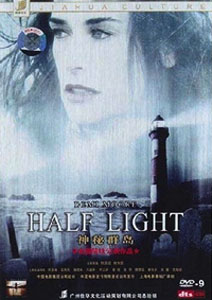 [SPOILER ALERT] But in the tradition of gothic romances of the 1960s, which are usually about trying to drive some weakminded heiress insane, Rachel's ghost-lover is really just a hired actor to help make her look mad. [SPOILER ALERT] But in the tradition of gothic romances of the 1960s, which are usually about trying to drive some weakminded heiress insane, Rachel's ghost-lover is really just a hired actor to help make her look mad.
This is so that her estranged husband (not the father of her dead son) can get rid of her & keep her millions. Except that unlike in the fake-ghost gothic romances, the ghosts that weren't real turn up in the end for a scary horror climax in which the evil plotters reenact a past tragedy & die while Rachel survives to write more potboilers. [END SPOILER ALERT]
All of which nonsense is presented as convincingly as possible by actors sufficiently skilled they almost pull it off -- until you realize how completely silly it all is, how clunky the story, how uneven the visual content.
Though good casting nearly overcomes the script, fact is this is no better written than the worst schlock & not really improved by having an Oxygen Channel veneer to keep even a meathook hanging from seeming too harsh.
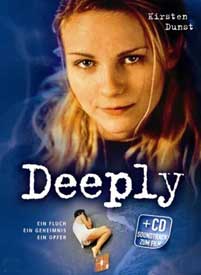 Lovely cinematography by Sebastian Edschmid gets Deeply (2000) out of the gate as a pretty thing at least, & I've no doubt it will be a great delight for viewers who dislike films that make them think. Lovely cinematography by Sebastian Edschmid gets Deeply (2000) out of the gate as a pretty thing at least, & I've no doubt it will be a great delight for viewers who dislike films that make them think.
Just as pretty is a ballady celtic score by Micki Meuser. However, the soundtrack incorporates some Irish music where Nova Scotian tunes belong, one of many give-aways that nobody bothered to do the research that might have given the environment legitimacy.
Claire & her mother Fiona (Julie Brendler & Alberta Watson) return to a rural island community on a nameless island off the coast of Nova Scotia. They don't behave like the island's "prodigal daughters" returning home so much as city slickers alarmed to encounter rural superstitions.
The fishing stocks have "mysteriously" vanished because a sacrifice to the sea is required, & old ways have been neglected. This is just one of the many points of the film that demand the viewer's inability to reason. The fish couldn't possibly have vanished from greedy overfishing or destruction of the environment or anything like that such as has actually occurred in this region. No, that's never the least bit likely. The sea needs its sacrifice.
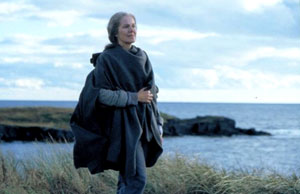 Claire reluctantly befriends a curmudgeon of a writer named Celia (Lynn Redgrave) who is working on a manuscript about the island's fairy legends, including a tale of the the Viking curse that still haunts the isle. Claire reluctantly befriends a curmudgeon of a writer named Celia (Lynn Redgrave) who is working on a manuscript about the island's fairy legends, including a tale of the the Viking curse that still haunts the isle.
With Celia's manuscript, the flashbacks begin, relating the tale of a girl named Silly, played by Kirsten Dunst, whose character name would seem to refer to her fake accent which she seems to have learned from watching one episode of Rebecca of Sunnybrook Farm. We're apparently not supposed to notice that Silly is a variant of Celia as the connection is revealed near the end as though it were a clever twist in the plot.
Every fifty years, someone needs to die for the sea, leaving behind a suffering lover. Silly is a jolly valley girl until she loses her sweetheart Jim (Trent Ford), just as Claire lost her sweety & is suffering as the film opens. If lovers' dreams aren't ruined in just this way, the fish will disappear. Never mind whether or not people drown pretty regularly anyway, & every lousy swimmer caught in an undertow likely left someone behind that loved them.
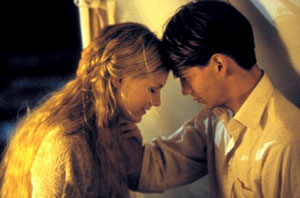 The underlying premise has reminded many a critic of The Wicker Man (the 1973 original, not the remake). But since there's not an ounce of terror in any of this romantic twaddle, I guess it's just a matter of thinking all pagans look alike. The underlying premise has reminded many a critic of The Wicker Man (the 1973 original, not the remake). But since there's not an ounce of terror in any of this romantic twaddle, I guess it's just a matter of thinking all pagans look alike.
The real root of the similarity is in the assumption that isolated islanders are clamp-mouthed godless hicks. Kinda like all hillbillies are alike whether they're from the hills of Appalachia or northern Idaho or the valleys of West Virginia; no actual individualizing culture underlies any of it.
Dunst is certainly not invariably an untalented actor, but she's miscast here. That she comes off as an amateur is partly the fault of poor direction, but she could've gotten her own dialect coach to prepare for the role before she even arrived on the sets & locations. And she could've gotten more comfortable with her costumes or sought out instruction on how to smoke a pipe rather than wiggle one around like a child's bubble-pipe or a random stage prop she'd never seen before that moment. So it's her own damned fault she comes off as the star of a junior college stage play.
Redgrave & Brendler are better casting but for the most part everyone reaches a level of acting worthy of nothing better than the Oxygen, Hallmark, or Women's Entertainment channels, foor nobody but Redgrave even comes close to saving the ineptly written dialogue.
An hour into the film & it still just seems to be marking time. A tedious love story, an unmysterious mystery, a lot of unlikely taciturn islanders, with a voice-over narrator required to explain what the hell is going on as it would otherwise make so little sense visually. It comes off as though based on a teenage romance novel & not a very good example of that genre.
I'm a sucker for tearjerkers but this one would take a moronic sucker, or a tween who has convinced herself she already knows heartbreak because the guy she got a crush on didn't come to her birthday party. Had it been legitimatey mysterious or mystical I could've gone along with the softness of the story. But films this utterly milquetoast just can't reach my heart.
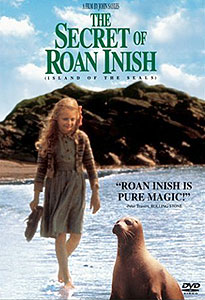 A film of somewhat similar appearance that did reach my heart was The Secret of Roan Inish (1994), which forever lingers in memory as a moving, mysterious fairy tale, family-worthy viewing but largely for adults. Unlike Deeply, it did not reduce islanders to be hicks, but conveyed a deep connection between a people & their culture of the sea. A film of somewhat similar appearance that did reach my heart was The Secret of Roan Inish (1994), which forever lingers in memory as a moving, mysterious fairy tale, family-worthy viewing but largely for adults. Unlike Deeply, it did not reduce islanders to be hicks, but conveyed a deep connection between a people & their culture of the sea.
Every gorgeous image enhanced with an unobtruse illuminating gaelic score by Mason Daring. A long-time collaborator with John Sales, Daring must have been particularly moved by this story or its setting, as he outdoes his own high level of film composition.
Fiona (Jeni Courtney) is only ten years old when she & her father return to a fishing village in Donegal to live with her grandparents. According to family legend, one of their ancestors married a selkie, a seal which can doff her skin to become a beautiful woman.
Fiona's ancestor found one of these doffed sealskins & hid it away so that the selkie could not return to the sea. She became his fairy wife & they raised a family before she found her sealskin & returned to her first home.
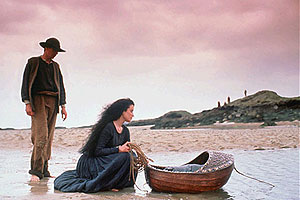 Fiona's mother has died & her baby brother was washed out to sea, so there is intense grief in the family. So far as the locals are concerned, the sea-dwelling branch of the family took the little boy, who could well be safe among them. Fiona's mother has died & her baby brother was washed out to sea, so there is intense grief in the family. So far as the locals are concerned, the sea-dwelling branch of the family took the little boy, who could well be safe among them.
Right away we are in the midst of a premise of startling beauty even if there was nothing more to it than dreamy wishful belief. But when Fiona catches sight of her brother apparently living like a wild child on the otherwise uninhabited island of Roan Inish, it all turns into a legitimately mystical tale.
The visual images of the coast, the island, & the sea are captured by the superior cinematography of Haskell Wexler. Director John Sayles' screenplay from a novel by Rosalie K. Fry enhances the beauty at the film's depths. It took the finest story, the finest director, & the finest cinematographer to make this such a haunting gorgeous film.
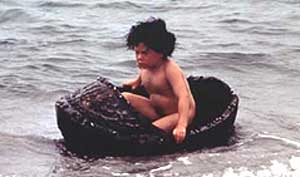 For primary example, the image of the tiny boy riding in the sea-going basket is at once terrifying, gorgeous, & eerily evocative of the fairies. For primary example, the image of the tiny boy riding in the sea-going basket is at once terrifying, gorgeous, & eerily evocative of the fairies.
And innocent young Fiona's attempt to unravel the mystery & get her brother back from the sea is given such startling realism that it could transform even the staunchest realist into a believer in Eld.
Though perhaps too slowly paced to hold younger childrens' attention, I think many kids would love this film because of the ten year old protagonist & the images of the feral boy. It unfolds like a poem, however, & plumbs such aesthetic, cultural, & emotional depths that adults will get the most out of it. It is the kind of parable that embodies so much truth & humanity that it rises to the level of true art.
copyright © by Paghat the Ratgirl
|
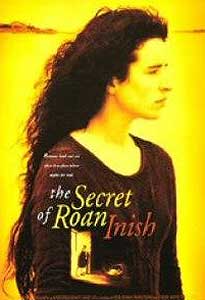

 The film also assumes that it's safe to take a tiny boat across a rough bay even in a storm, & that no knowledge of tides is required to hop back & forth from the main island to the lighthouse island.
The film also assumes that it's safe to take a tiny boat across a rough bay even in a storm, & that no knowledge of tides is required to hop back & forth from the main island to the lighthouse island. Scenes of Rachel horseback riding with her lover, bedroom scenes, romantic conversations, to a soundtrack suited for shopping at Victoria's Secret, renders much of the film a cloying Harlequin Romance, totally boring. Only the promise of eventual peril makes it bearable, & then only just.
Scenes of Rachel horseback riding with her lover, bedroom scenes, romantic conversations, to a soundtrack suited for shopping at Victoria's Secret, renders much of the film a cloying Harlequin Romance, totally boring. Only the promise of eventual peril makes it bearable, & then only just. [
[
 Claire reluctantly befriends a curmudgeon of a writer named Celia (Lynn Redgrave) who is working on a manuscript about the island's fairy legends, including a tale of the the Viking curse that still haunts the isle.
Claire reluctantly befriends a curmudgeon of a writer named Celia (Lynn Redgrave) who is working on a manuscript about the island's fairy legends, including a tale of the the Viking curse that still haunts the isle. The underlying premise has reminded many a critic of
The underlying premise has reminded many a critic of 
 Fiona's mother has died & her baby brother was washed out to sea, so there is intense grief in the family. So far as the locals are concerned, the sea-dwelling branch of the family took the little boy, who could well be safe among them.
Fiona's mother has died & her baby brother was washed out to sea, so there is intense grief in the family. So far as the locals are concerned, the sea-dwelling branch of the family took the little boy, who could well be safe among them. For primary example, the image of the tiny boy riding in the sea-going basket is at once terrifying, gorgeous, & eerily evocative of the fairies.
For primary example, the image of the tiny boy riding in the sea-going basket is at once terrifying, gorgeous, & eerily evocative of the fairies.